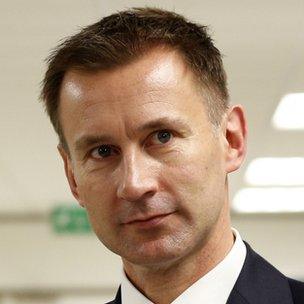Why are doctors so angry?
- Published
- comments

Doctors have no confidence in Health Secretary Jeremy Hunt
When the British Medical Association conference passed a vote of no confidence in the health secretary this week it seemed almost inevitable.
Doctors speaking during the debate were angry.
Led by consultant radiologist Jacky Davis, who said the NHS in England had been "wrecked" by the "vandals in Westminster", speaker after speaker was critical of what was happening.
Traditionally the chair of the BMA, who at the end of debates gives their view on the issue, takes a more moderate line. But not this time. Dr Mark Porter said doctors should show no mercy.
Referring to the no-confidence motion passed last year in Andrew Lansley, Dr Porter said the vote was in "danger of becoming a BMA tradition" before adding: "Some traditions are comfortable and should be maintained."
And that debate on Monday was not the only occasion during the conference that ministers have felt the anger of the medical profession.
In his speech to open the event, Dr Porter mocked ministers, questioning whether they even understood what was happening on the front line.
And on Wednesday, in his final speech as the GP leader at the BMA, Dr Laurence Buckman said ministers were using GPs as a "political football".
Profound worries
But it was not always like this.
Of course the BMA - a trade union, after all - has had a long history of being critical of the government.
However, no-confidence motions in individuals were rare until last year, and when they did make it onto the agenda they tended to get voted down as doctors did not want to seem to be stooping to personal attacks.
So what has changed?
There have been many grumblings about the detail of the government's reforms in England.
But the impression listening to doctors is that the real bone of contention is much more basic than that: they are genuinely fearful for the future of healthcare and what this means for their working lives.
While the NHS budget is being protected, the service is still being asked to make savings of nearly 5% a year to help it cope with factors such as the ageing population, the cost of new drugs and obesity.
It has prompted some areas to ration access to care, cut jobs and close services.
London GP Jackie Applebee believes the "NHS is in peril", and wants the government to do more.
"There is plenty of money in society to pay for the NHS. We have tax avoidance left, right and centre, billions that have been wasted on PFI [the private finance initiative]."
Dr David Wrigley, who works in the North West, says services are in "financial meltdown", yet the government was being "Orwellian" in talking about efficiency savings.
Or as one senior BMA official put it more bluntly this week: "It's not really about the reforms. It's the fact money is tight, which means services are being cut, care is suffering and jobs are at risk.
"The mistake this government made was putting everything together in a bill and allowing us to use it as a stick to beat them. They were stupid."